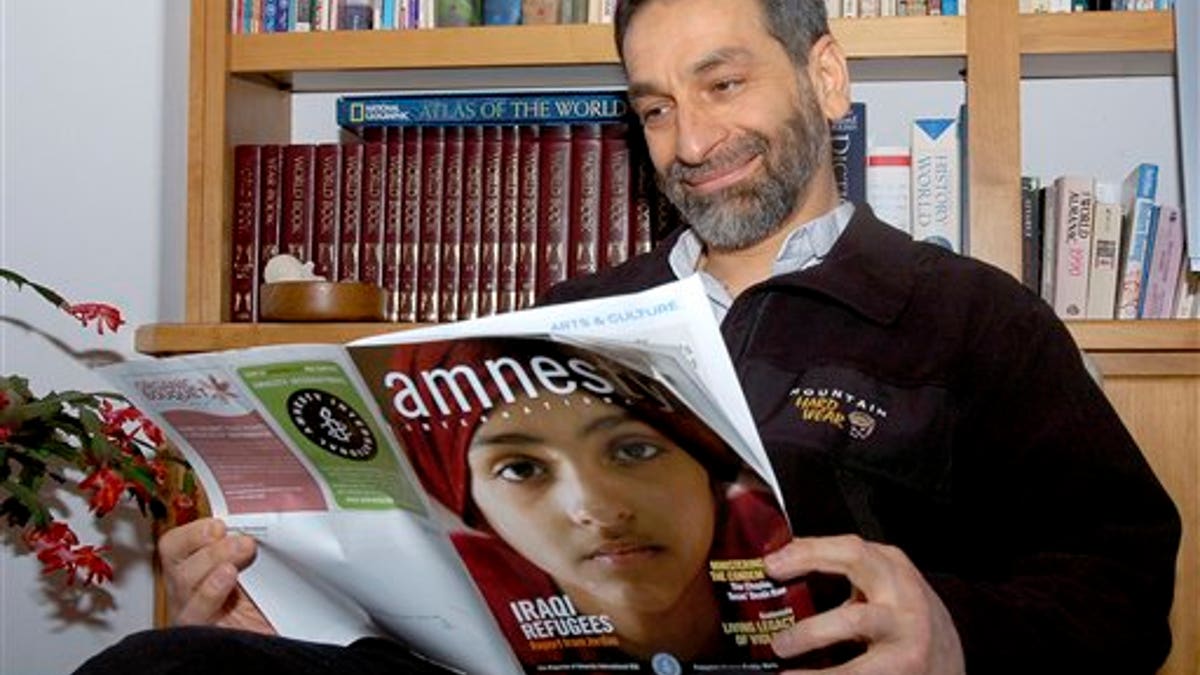
November 2007: Pirouz Sedaghaty, known as Pete Seda, the co-founder of Islamic charity Al Haramain, at his house in Ashland, Ore., after he was released from jail while awaiting trial on federal tax and conspiracy charges. (AP)
A federal judge in Oregon denied a new trial for the leader of the U.S. branch of a now-defunct Islamic charity who was convicted of smuggling $150,000 that prosecutors said was intended for Muslim fighters in Chechnya.
The ruling came late Wednesday in the case of Pete Seda, also known as Pirouz Sedaghaty, an Iranian-born tree surgeon who ran the U.S. chapter of Al-Haramain Islamic Foundation in Ashland, Ore.
The government declared the foundation a terrorist organization, but the organization is fighting that designation.
Seda was convicted last fall of tax fraud and conspiracy to defraud the government by helping smuggle money out of the country through the foundation.
"The evidence supported the government's theory in this case that defendant and others conspired to conceal a transaction destined for the Chechen mujahedeen and the jury rationally concluded as much," U.S. District Judge Michael Hogan wrote in his ruling filed in Eugene, Ore.
Seda's attorneys filed motions for a new trial after it was revealed an FBI agent had failed to disclose an offer to pay hairdresser Barbara Cabral, a witness in the case whose husband had been a paid informant while they attended services at Seda's prayer house and went with him on a pilgrimage to Mecca.
Court documents state FBI agents paid $14,500 cash to Richard and Barbara Cabral, and were trying to pay her $7,500 more. He died before trial and she testified for the prosecution about their contacts with Seda.
Defense lawyers argued that having the information on the money would have allowed them to question the credibility of Cabral's testimony, which included a statement that Seda had asked her and her husband for contributions to go to mujahedeen in Chechnya.
Hogan wrote that Cabral's testimony had no bearing on Seda's convictions for signing a false tax return and conspiring with Al-Haramain co-founder Soliman Al-Buthe, a Saudi Arabian who left the country with the money in 2000.
Defense attorney Steven Wax said he was disappointed with the ruling but expected to resolve the issues on appeal.
The ruling opens the way for Hogan to sentence Seda, who has been free on bail and living in Portland since the motions for a new trial were filed. Sentencing is scheduled Sept. 27.
U.S. Attorney Dwight Holton said in a written statement the court had resolved all pending motions and his office was ready to defend an appeal, noting the judge rejected "every single one of the defense arguments."
The prosecution has been seeking the maximum eight years in prison, based on the terrorism enhancement, arguing that Seda intended the $150,000 to go to guerrillas fighting against a country that was at peace with the United States. Seda was never charged with terrorism, and the prosecution never established what happened to the money after it landed in a bank in Saudi Arabia.
The defense contends Seda should get probation, with credit for time in jail while awaiting trial.
The Treasury Department froze the assets of the Ashland chapter of Al-Haramain and declared it a "specially designated global terrorist" on Sept. 9, 2004.
Last December, a federal judge ordered the U.S. government to pay more than $2.5 million in attorney fees and damages after he concluded investigators wiretapped the foundation's phones without a warrant.
Hogan also denied motions to dismiss the case, to acquit Seda of the charges, a separate set of arguments for a new trial, and for more information from the government about a former Russian counter-terrorism agent who testified during a sentencing hearing.
Col. Sergey Ignatchenko testified by video from Russian that his agents found evidence that Al-Haramain was financing Islamic fighters battling the Russian army in Chechnya, but he had never heard of Seda.





















